The New 'Biggest Loser' Aims To Focus On More Than The Scale
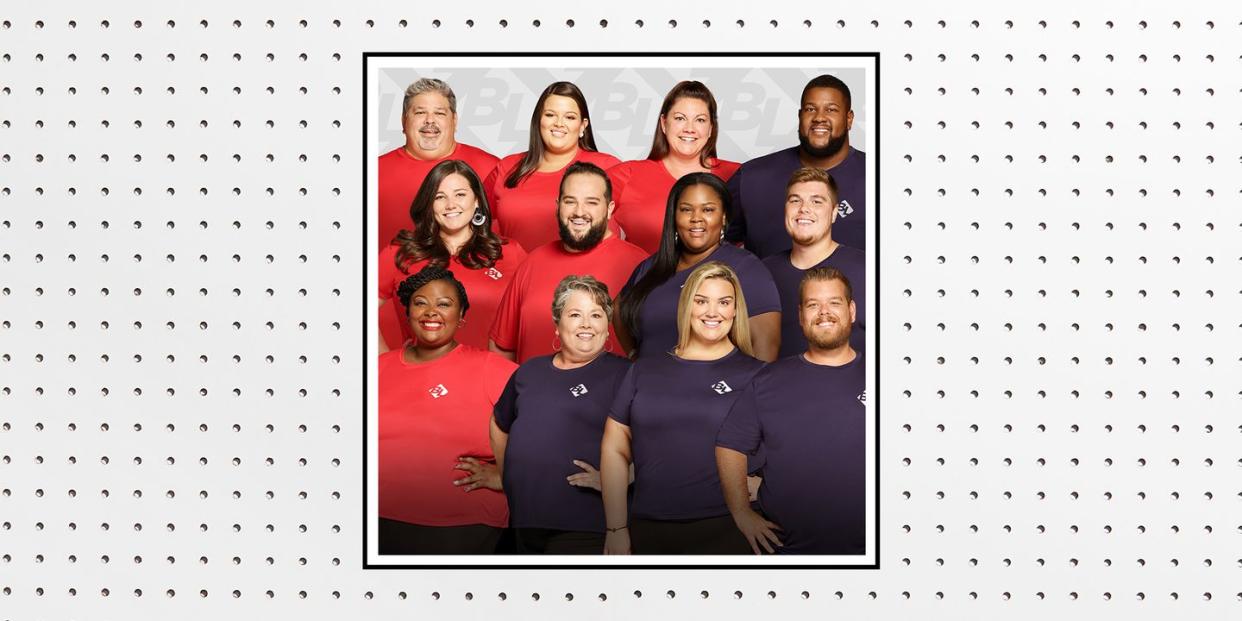
I’m 15 miles outside of Santa Fe in Glorieta, New Mexico, at the site of a 2,400-acre Christian adventure camp for kids. It's September, so there are no children or counselors staying in the cabins, traversing the ropes course, or canoeing on the pond. Instead, the classrooms and cafeterias on the grounds have been taken over by the production crew for The Biggest Loser, one of the most widely-watched television shows in history.
After 17 seasons on NBC and then a four-year hiatus, the show is returning to USA Network on January 28, 2020—with updates that producers have described as a holistic, 360-degree look at wellness for contestants, rather than a focus on just numbers.
One of those producers gives me a tour of the set, and as we zip around the trails on a golf cart, it feels like we're the only people around—save for a few other producers muttering into walkie-talkies. But the campus comes to life when a van pulls up and several men and women in bright blue and red T-shirts file out.
The contestants laugh and tease each other like old friends. They've been filming for two weeks and will continue to endure fitness challenges for the next nine weeks (followed by five weeks at home, where they'll try to lose even more weight ahead of the finale).
I follow them into the largest of several camp-buildings-turned-studios—the gym where they exercise and where weigh-ins are filmed. The room is stocked with stationary bikes, weights, medicine balls, resistance bands, you name it. BL logos and neon “Lose Big” signs decorate the space. A 25-meter semi-circle track wraps around the weigh-in area; the curved, semi-reflective black walls with red and blue back-lit panels make it feel like I'm inside a sleek spaceship.

This makeshift gym is where I interview the female contestants for a series of profiles on why they auditioned for the show. "It is super exciting to be here," says contestant Kim Davis. "I've actually tried out for the show three times. When I saw the casting call for this season, I thought, 'Boy, dreams do come true. I'm gonna change my life.'"
For contestant PhiXavier Holmes, stepping away from work and family to spend time with trainers and nutritionists felt like the only thing that would help her take control of her health. "My weight has been the one area I couldn't win in," she tells me. "And when I heard about the show, I thought, 'What other opportunity will I be faced with where I can dedicate complete time away from everyone and everything that could be a distractor for me to focus on this area so that I can win, you know?'"
The contestants' excitement almost makes me forget the controversy surrounding previous seasons of the show: The claims that some contestants were given illegal medication to speed up weight loss. The fact that they were encouraged to dehydrate themselves and eat very little for more dramatic weigh-ins. And the complaints that they were generally mistreated both on- and off-camera.
One of the producers' main pitches when they ask Women’s Health to come visit the set of The Biggest Loser is that the reboot is different—that the show isn't just about weight loss this time around.
In the new season, producers have carved out time for on-air life-coaching sessions—led by former Biggest Loser trainer-turned-host Bob Harper. These check-ins, which take place multiple times a week, are meant to let contestants talk about how they're feeling throughout the process and eventually identify and address some of the root causes of their negative habits.
"It's a space where they can just let their voices be heard," Harper says. "I'm not a psychiatrist. But I've been in therapy for a very, very long time. And this is a space where they can say whatever they're thinking or feeling. It's cathartic." (In this season and past seasons, a therapist has been available to contestants if they wanted to chat with them, but those discussions weren't aired.)
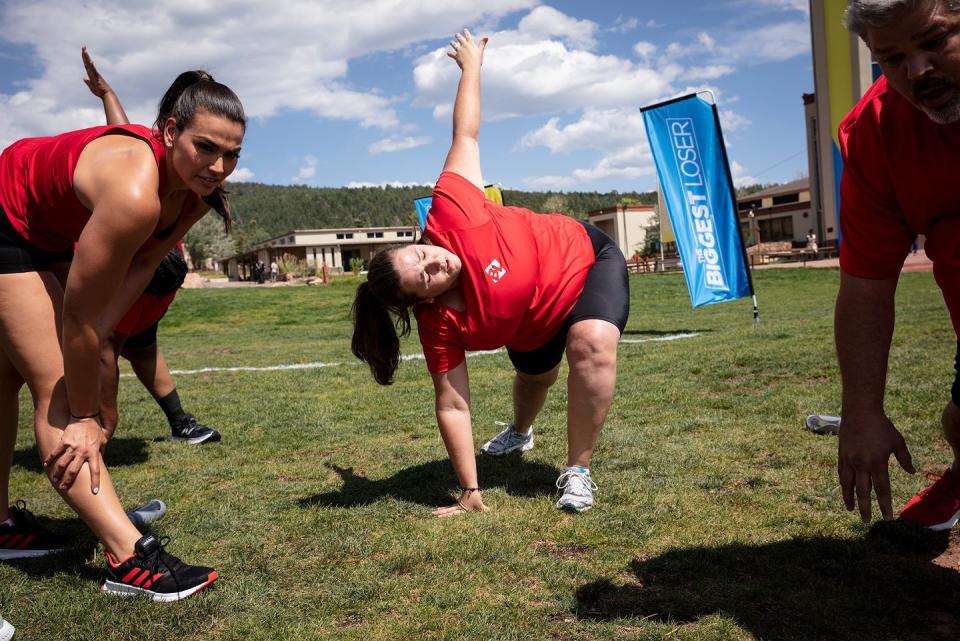
Producers also say that the show will feature more education on the pillars of health that fall outside fitness, like personalized nutrition, sleep, and mental health. Contestants follow individualized diets determined by The Biggest Loser medical teams and are required to eat a minimum amount of calories (though it's unclear if the viewer will see these changes on air).
"We're really focusing on the mind-body connection," says Harper, pointing to challenging workout competitions—think: a timed mile run or flipping tractor tires through a mud pit—as not only physical exercise, but as chances to overcome emotional hurdles and build mental strength.
In an effort to help contestants maintain any weight loss they experience on The Biggest Loser, producers are also offering continued support for those who are eliminated by way of a year-long Planet Fitness membership and access to nutrition counseling and weight-loss support groups. Harper says this will help them maintain their new habits from the show. "The more people that you have in your corner, the better. It takes a village to lose weight and keep it off."
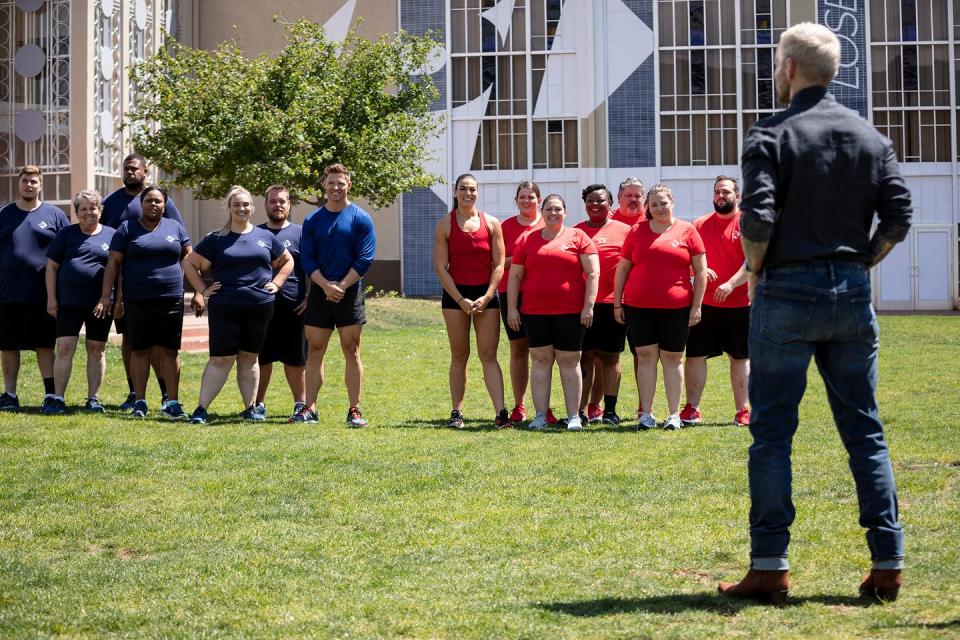
New trainers are another key part of the show’s refresh: Erica Lugo and Steve Cook both say they're committed to avoiding the use of fat-phobic language—and that instead, they are trying to combat the viewpoint that being healthy equates to being a specific size. (Jillian Michaels, who served as a trainer in previous seasons alongside Harper, declined to speak to WH for this piece.)
"I want to change the way people think of others who struggle with their weight," says Lugo, who lost 160 pounds herself before becoming a fitness professional. "'Lazy,' 'fat,' 'gross;' I know those words were thought about me at one point...these people are none of those words."
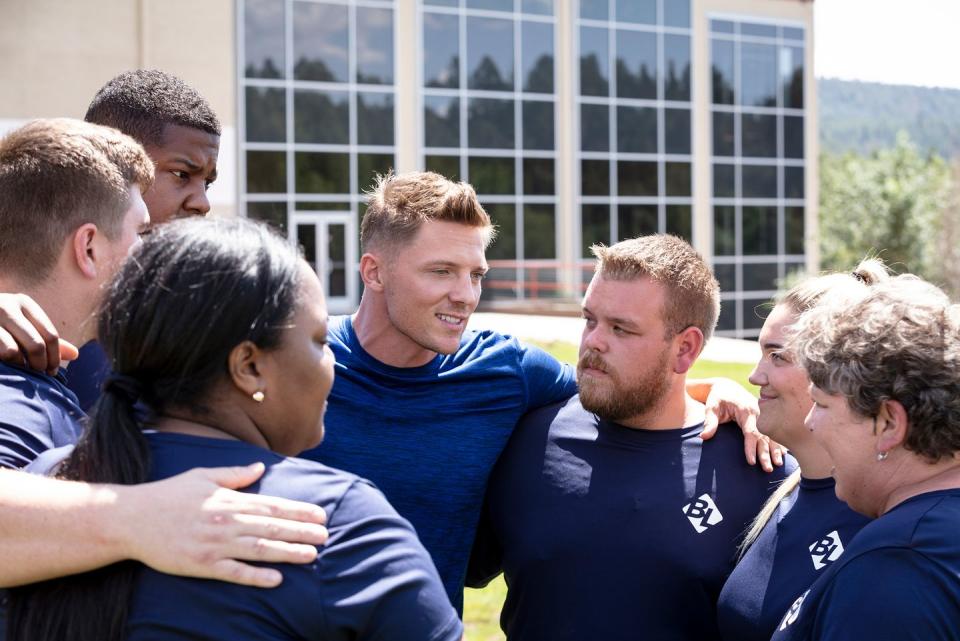
The show's previous seasons faced criticism from a variety of sources, including academic researchers who took an interest in the series.
In 2016, a study in the journal Obesity looked at the impact of the show on Season 8 Biggest Loser contestants' metabolisms, following 14 of the men and women for six years after the show ended. Researchers found that their resting metabolisms (or how many calories a person burns at rest) were permanently slowed after filming wrapped.
It’s normal to see a drop in resting metabolism after weight loss of any kind, as the body clings to calories when it senses it’s in starvation mode. Still, as long as they aren't losing weight too fast, peoples' metabolisms typically “bounce back.” But for the Season 8 contestants, some of whom regularly lost around 20 pounds in a week, experts noted that their metabolisms had slowed severely, meaning they couldn’t eat as much as an average person of their size without gaining weight, even years after the show.
On top of that, the contestants’ levels of leptin, a hormone that controls hunger—were nearly nonexistent by the time the show ended, making them feel constant, intense hunger. As a result, by the end of the six-year study, all but one of the contestants regained some or all of the weight they’d lost on the show.
Eric Ravussin, PhD, a professor of human physiology at the Pennington Biomedical Research Center in Baton Rouge, Louisiana, led his own study on The Biggest Loser contestants. He compared them to people who'd lost similar amounts of weight through bariatric surgery and found that the surgery patients experienced less of a drop in metabolic rate. He suspects this is because they lost weight more slowly.
"Slower weight loss is always more desirable," Ravussin says. "But of course, The Biggest Loser is a competition—and slow and steady doesn’t work in that setting."
For his part, Harper also points to gradual weight loss as the ideal for people trying to drop pounds in real life. "I tell people not to bite off more than they can chew in the beginning,” he told me back in September. “You want to make sure that what you're doing from the start is something that you can sustain, both with the diet you choose and your exercise."
He clarified in a follow-up email that he acknowledges the way people lose weight on The Biggest Loser is different, and that it's difficult to compare contestants on the show to the average person trying to lose weight. "I think our show is unique in the fact that our contestants are in a bubble where they do lose weight faster because all the other distractions of life are not in their way," he said.
The Biggest Loser may have a negative impact on viewers, as well, suggests a 2012 study from Medicine & Science in Sports & Exercise. In the research, viewers exhibited more anti-fat attitudes after watching the show.
Some opposers of the series feel there’s no place for The Biggest Loser as our culture moves toward body positivity and a better understanding of the relationship between weight and health.
In particular, the show's focus on weight as an all-important indicator of health is problematic, says Yoni Freedhoff, MD, founder and medical director at the Bariatric Medical Institute in Ontario, Canada.
“Weight is a risk factor for lots of health conditions, and yes, losing weight for many people improves health and sometimes quality of life,” he says. “But the goal for health should not be solely about losing weight; it should be about living the healthiest life that one can enjoy. ...Making a lower weight the only goal leads to maladaptive behaviors and eating disorders, and The Biggest Loser avoids the realities that obesity requires a lifetime of care and sustainable and enjoyable exercise and diet habits."
Hilary Kinavey, a licensed professional counselor with Be Nourished, a self-care program aimed at reducing body shame, agrees that the premise of the show spreads misconceptions that health can be achieved through a lower weight alone—and that everyone should be striving for that.
“It isn't a body-positive show,” she says. “It makes people fear fat bodies.”
Researchers aren’t the only critics of The Biggest Loser. Many former contestants have also come forward to say being on the show was a traumatic experience.
Season 3 runner-up Kai Hibbard has been outspoken about the show’s issues—despite cease and desist letters from NBC—in the 13 years since she was on it.
“When I went home before the finale, I had severe eating disorders, and I was working out for eight hours a day to maintain my weight loss,” Hibbard says. “My family staged an intervention, but I was still struggling. My hair was falling out, I’d lost my period, I was covered in bruises and clearly overtraining. When I tried to tell the producers I needed help, they told me to ‘save it for the cameras.’ That’s when I realized the show was completely exploitative, and to hear that it was coming back was incredibly disheartening."
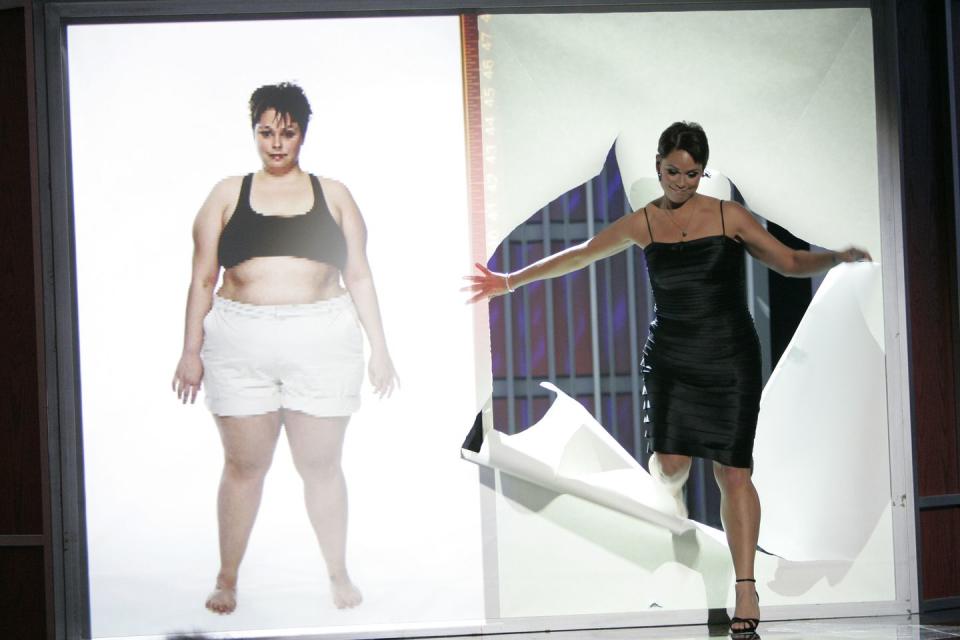
Other contestants have publicly said they found the extreme weight loss and the culture of the show harmful as well. "The Biggest Loser doesn’t save lives,” Season 2 contestant Suzanne Mendonca told The New York Post in 2016. “It ruins lives. Mentally, emotionally, financially—you come back a different person. Half the people from my season have gotten divorced. The ripple effect isn’t just weeks or months. It’s years.”
When asked if the show's changes are meant to combat controversies surrounding the old format, USA producers told WH that "USA was in a unique position to have 17 seasons of research from the first run of The Biggest Loser and bring back what worked, shift some focus, and add in elements that are appropriate for a 2020 viewer. ...On this season, there was a zero-tolerance policy for any negative behavior on set."
Granted, not all former contestants say their time on The Biggest Loser was a negative experience.
“I would do it again in a heartbeat,” says Amanda Arlauskas, a member of the BL Obesity study and a contestant on Season 8. “I didn’t know anything about fitness or nutrition or how to live a healthy lifestyle prior to the show, and what I learned from Bob and [former trainer on the show] Jillian Michaels has helped me over the last 10 years.”
Arlauskas, like Hibbard and many contestants, also received career opportunities as a motivational speaker after the show. She did struggle with weight regain, though, and noted that the new show’s efforts to provide support following elimination were a step in the right direction.
“I gained 40 pounds right back after the show ended," Arlauskas tells WH. "I was thrown back into the real world and I didn’t know how to handle it. But once I noticed it creeping back up, I got it under control and have been able to maintain most of my weight loss. But I also lost weight on the show relatively consistently—five pounds a week—and I think staying on the lower end of how much people lose on the show weekly and lose overall has helped me be able to maintain.”
In December, I watched the first two episodes of the 2020 season, curious to see if it would feel different than the old, highly controversial seasons.
To be fair, I wasn't an avid viewer of the show when it was on the air before. But I've watched old episodes as part of my research, and outside of the trainers using more positive language with contestants, the show feels largely the same.
In the first two episodes, contestants start working out for four or more hours a day the moment they step on campus.
I witnessed this when I visited the set in September, as well: There were still puke buckets set up around the gym (the women contestants even told me they used them frequently). I also saw one contestant receive brief medical attention because her toe was bleeding and the nail was falling off after two weeks of filming.
Quick weight loss among contestants, the show’s hallmark, is also still present: In the first episode, one male contestant loses 22 pounds in one week. Other contestants lose pounds in the double digits, some for multiple weeks in a row.
I was also struck by the fact that the weigh-in portion takes up almost a third of the two episodes I watched—a large chunk of airtime despite producers' claims to focus on more than numbers.
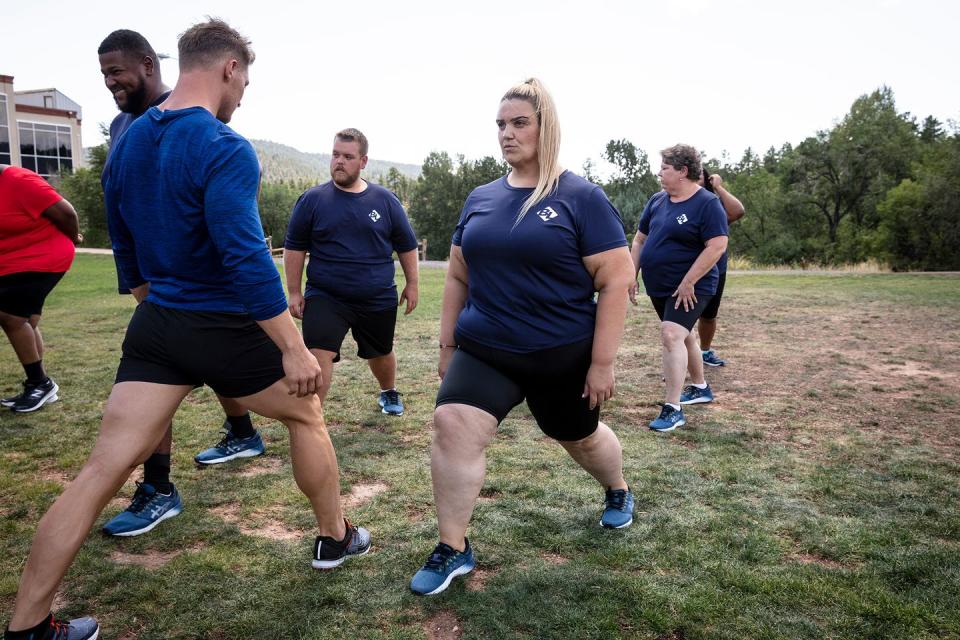
At the same time, I could see how contestants' decisions to participate on the show could be a potential catalyst toward a life where they feel empowered to put themselves and their needs first, especially after talking to a few of them on set in September.
"What it comes down to is that we all just needed the jumpstart," current contestant Davis told me, adding that she needed something like The Biggest Loser. "It's so hard to get started when you're at home. I needed this opportunity to wrap my head around what it's going to take. And no matter when I go home, I know I have tools to keep going."
I could also understand why viewers may get sucked into the show, because the effort these people are putting in is extremely admirable. But it becomes hard to watch when contestants feel disappointed when they don't lose double-digits week after week, and are sent home for "failing" their team, even after massive weight loss.
“I wish that people who have lost and gained and lost and gained knew that they’ve tried harder at this than anything, and the idea that they were lazy and complacent is wrong,” says body-image counselor Kinavey. “They tried something that just doesn’t work for most people.”
Producers maintain that the continued support contestants will receive this season sets them up for success after they go home, and that for many, their health is improved by the show. On this season, "contestants have had their pre-diabetes risk go away and their sleep apnea decrease substantially with their weight loss," producers said in an email.
Ultimately, producers of course encourage detractors to watch the new season. "The series is about putting people on a path to make their bodies and minds as healthy as they can be,” they said to WH. “And yes, exercise, nutrition, and losing unhealthy weight are a part of that."
The Biggest Loser will air on USA Network for its 18th season on January 28th, 2020.
You Might Also Like

